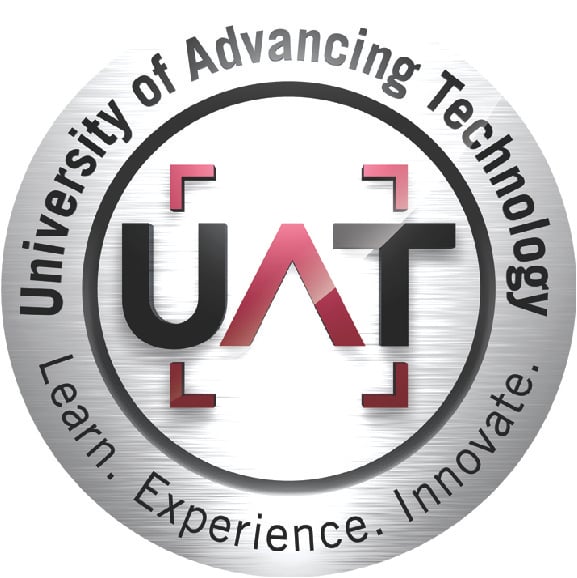Technology is the life force of University of Advancing Technology (UAT). Fostering technology discussions and exploring the edge of innovation are what UAT does best. In spirit of advancing technology, UAT constantly invites guest speakers to visit campus to impart wisdom, facilitate discussion and provide networking opportunities and community connections with students.
Tim Roemer, a 2022 UAT Honorary Doctorate recipient, visited campus to speak with students about the State of Arizona's Five Cs of Cybersecurity. The five Cs include culture, communication, collaboration, conviction and consistency. Before presenting to all of UAT and the community, he held a private luncheon for cyber security students, allowing them to dive deep into their cybersecurity questions.
“I can tell you from real world experience that, unfortunately, there are still myths out there at senior levels of government and law enforcement about cybersecurity. People still throw the term cybersecurity out when they just mean general technology. But we’re going to take it because it gives us momentum.”
Tim Roemer was appointed by former Governor Ducey in April of 2021 as the Director of the Arizona Department of Homeland Security. Director Roemer advised the Governor on a wide range of topics including cybersecurity, border security and counterterrorism.
Director Roemer also manages cybersecurity for the State of Arizona as the State’s Chief Information Security Officer (CISO). As State CISO, Director Roemer leads the State’s cybersecurity team, sets cybersecurity strategy and defends the State against evolving cyber attacks that threaten citizens' data and Arizona’s critical infrastructure. Through consistent vigilance of culture, communication, collaboration, conviction and consistency, Director Roemer will help Arizona improve cybersecurity resiliency.
“My team has regularly scheduled calls with technology leaders in the State to update them on what to be on the lookout for and what we are blocking at a state level. For the longest time, one of the biggest things criminals were utilizing in phishing emails were COVID heat maps, so it was like 'click here for a heat map of COVID cases in your community' and that's how they were getting a lot of government employees to click on the phishing emails.”
Director Roemer’s career is quite impressive. He has served the State of Arizona in a variety of leadership roles prior to his current appointment. This includes four years in a dual role as the Governor’s Public Safety Advisor and Deputy Director of the Arizona Department of Homeland Security, one year as the Governor’s Deputy Director of Legislative Affairs and two years as the State’s CISO. Director Roemer has served on numerous Boards and Commissions including the Arizona-Mexico Commission’s Security Committee and the Human Trafficking Council since the beginning of former Governor Ducey’s Administration in 2015.
"Recently, the human trafficking counsel has been asking my team for some help because my team is naturally very good online… They're better than most criminal investigators, they can find things out a lot faster. They can write rules for things and consolidate information a lot faster."
Director Roemer served in the Central Intelligence Agency for 10 years before working for the State of Arizona. The final two years of his CIA career were spent assigned to the White House Situation Room, where he provided critical national security updates to the President, Vice President and National Security Council. In this role, he was responsible for briefing senior U.S. policymakers on a broad range of national security-related issues.
Director Roemer supported the CIA mission at its headquarters in McLean, Virginia in addition to his time in the West Wing. Over his decade-long career in the U.S. Intelligence Community, he also completed assignments at the National Geospatial Intelligence Agency and the National Reconnaissance Office.
It was a great event that helped showcase to students the vast ways their careers in cybersecurity could go. At UAT, it's important to for us to introduce students to the real world possibilities of their future. This event granted them the ability to pick the brain of a very successful cybersecurity professional.




Comment